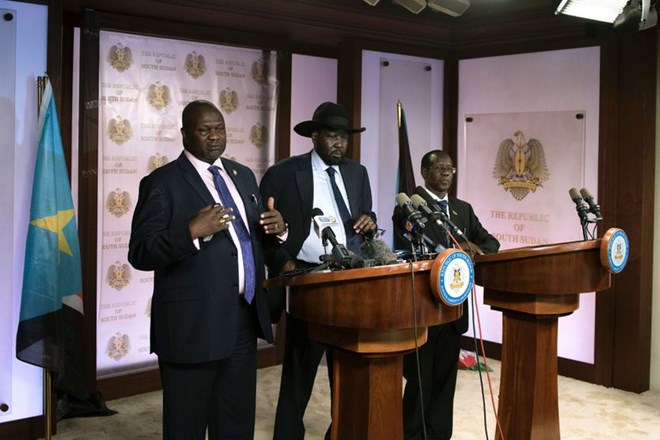
By JACEY FORTIN and JOSH KRON
Sunday, July 10, 2016

Vice President Riek Machar, left, speaking to reporters with President Salva Kiir, center, and Second Vice President James Wani Igga before shooting erupted outside the presidential palace in Juba on Friday. Credit Charles Atiki Lomodong/Agence France-Presse — Getty Images
JUBA, South Sudan — Fighting between competing factions of South Sudan’s government in its capital left the world’s youngest country teetering on Saturday, the fifth anniversary of its independence.
The government reported dozens of casualties, and there were unconfirmed reports that up to 150 people had been killed.
Outbreaks of shooting on Friday night between forces loyal to the country’s president, Salva Kiir, and forces loyal to its vice president, Riek Machar, surprised both leaders, said Ateny Wek Ateny, a spokesman for Mr. Kiir. Heavy gunfire was exchanged across neighborhoods during the night, including outside the presidential palace, where the two leaders were meeting.
Mr. Machar became the leader of a formal rebellion in December 2013, until he returned in April to join the government.
Mr. Ateny said many people, mostly soldiers, had been killed in the latest bout of fighting. “It is too early to talk about the number of casualties because the fighting was heavy, and the military is actually forming a committee to investigate,” he said.
The Associated Press reported that scores of bodies had been taken to Juba’s hospital and morgue. The morgue at the main hospital was roped off and guarded by policemen, who did not relay information about the casualties inside.
“A lot of people were wounded, hurt and killed, last night,” said Jürg Eglin, the head of the International Committee of the Red Cross in South Sudan.
“The general situation is confusing,” Mr. Eglin said. “We have no clear picture of what actually happened, or who was attacked.”
Soldiers rode along the main thoroughfares in trucks and motorcycles on Saturday, or stood watch on street corners. But with shops closed and most civilians staying home, the streets of Juba were mostly quiet.
The United States Embassy in Juba warned that the capital was not stable, and warned civilians against venturing outside.
“The situation in Juba remains fluid,” the embassy said in a statement. “Government leaders are attempting to restore calm. However, these actions are not yet successful. Large numbers of troops remain on the streets.”
Tensions between the forces of Mr. Kiir and Mr. Machar, always lurking beneath the surface, first erupted Thursday night, when two factions confronted each other at a roadside checkpoint. Five government soldiers were reported killed.
South Sudan’s military said it was treating that attack as an “isolated incident,” but heavy exchanges broke out again on Friday. At one United Nations camp, up to 25,000 people took shelter from the fighting.
For many years, southern Sudan’s political factions worked together in brittle alliances to fight for independence from Sudan.
The United States played an instrumental role in securing South Sudan’s independence and statehood from Sudan, after decades of resistance fighting, and Mr. Kiir became South Sudan’s first president, and Mr. Machar its first vice president, on July 9, 2011.
But factions soon turned their grievances toward one another.Mr. Kiir dismissed his cabinet in July 2013 over the tensions, and violence broke out that December, quickly splitting the nation along largely ethnic lines. Mr. Kiir belongs to the Dinka ethnic group, the country’s largest, while Mr. Machar is a member of the Nuer minority.
Mr. Machar fled the capital and became the leader of a formal rebellion, but he returned this year under a peace agreement.
Tens of thousands of civilians and soldiers were killed in the civil war and in related violence.
“This is the most perilous moment for South Sudan since the violence of December 2013,” said John Ryle, the director of the Rift Valley Institute and an analyst on the two Sudans.
The shooting that erupted as both leaders were meeting inside the presidential palace, Mr. Ryle said, “reveals the uncertain control they exercise over their own security forces — and the extreme fragility of the peace accord.”
________________
Jacey Fortin reported from Juba, and Josh Kron from Kampala, Uganda.